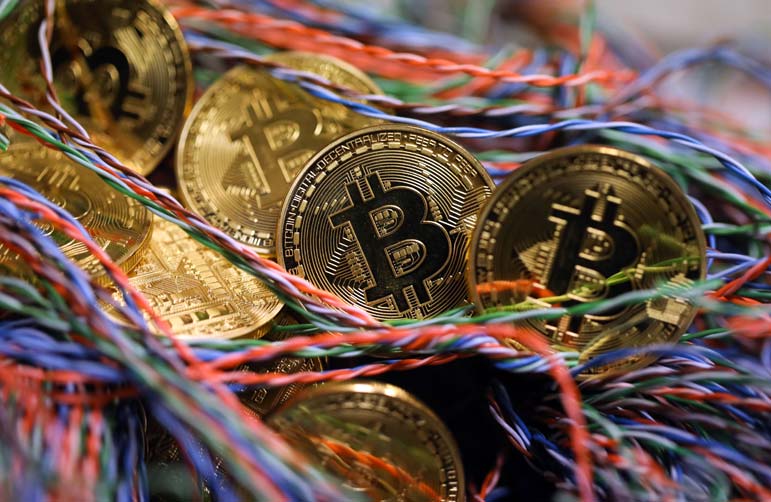 Chris Ratcliffe for Bloomberg
Chris Ratcliffe for Bloomberg
A little more than three years ago, I made the worst investment decision of my life. "You know, Dad," my then 15-year-old son said, "you really ought to buy some bitcoin." Yes, that's right, bitcoin: the newfangled "cryptocurrency" based on something called blockchain technology, invented in 2008 by a mysterious Satoshi Nakamoto.
"Listen, son," I said, "that is no way to invest my hard-earned pounds ... The governments of the world are not about to let their monopolies on national currencies be undermined by a currency that's already being used for nefarious purposes by criminals and money launderers." Son: "Yes, but …" Me: "No buts --I'm not throwing real money down the virtual drain."
In October 2014 --when something like that exchange took place --the price of one bitcoin was ÂUS$334. As I write, it is US$15,150. If I had listened to my son, I would have increased the dollar value of my investment by a factor of 45 --or, if you prefer, I'd have made a return on the investment of 4,436 per cent.
It's never too late to recover from an investment blunder, of course. But what if buying bitcoin now would make me the "greater fool" --the last man in, who gets left holding the bitcoin when the bubble bursts and the price plummets? Financial history is full of examples of investment manias that at some point turned into panics and crashes.
He accidentally threw away his bitcoin codes in 2013. Now they're worth US$108 million
Like the five stages of grief (denial, anger, bargaining, depression and acceptance), there are five stages to most financial bubbles. First, displacement: a change in economic circumstances creates new and profitable opportunities. A new financial asset is born. Second, euphoria: where expectations of rising profits lead to a rapid rise in the price of the asset. Third, mania: the prospect of easy money attracts first-time investors as well as swindlers eager to part them from their cash. Fourth: distress: the insiders discern no future gains can possibly justify the now exorbitant prices and begin to take profits. Fifth: revulsion or discredit: as prices fall, the outsiders all stampede for the exits, causing the bubble to burst altogether.
Bitcoin: financial revolution or modern tulip mania?
The analogy favoured by bitcoin sceptics is the mania for tulip bulbs that swept Holland between 1634 and 1637. Bitcoin is "worse than tulip bulbs", said Jamie Dimon, JP Morgan's chief executive, at a conference in September. "It's a fraud," he declared.
"Bitcoin is a sort of tulip," observed European Central Bank vice-president Vitor Constancio at around the same time. "It's ... an instrument of speculation ... but certainly not a currency."
Bitcoin begins trading just as Asian markets open up for the week
But tulip mania is not the right analogy for understanding bitcoin. As the South Sea Bubble of 1719-21 revealed, financial innovations are often accompanied in their initial stages by bubbles; the inevitable bust doesn't necessarily kill the innovation. South Sea Company share prices may have inflated and then collapsed, but that didn't spell the end of tradeable shares as financial instruments, they went on to become the foundation of corporate finance.
Why has China declared war on bitcoin and digital currencies?
Something similar will prove to be true of bitcoin and cryptocurrencies in general. It's not so much that blockchain-based coins and tokens will replace the fiat money we have grown accustomed to using since the demise of the gold standard. Rather, there are at least three other uses for the new financial technology that will persist even after this bubble bursts.
First, bitcoin has established itself as a kind of digital gold: a store of value for wealthy investors, especially those in countries with a weak rule of law and high political risk. Second, "initial coin offerings" that raise money in bitcoin and another big cryptocurrency, ethereum, have emerged as a quick and easy way to finance innovation --a digital alternative to issuing shares. Third, as blockchains are a near-unhackable, cryptographic method for preserving data across a computer network, they can be used for a variety of transactions. In future, the title deeds for property will take this form. This is already happening in the republic of Georgia. Meanwhile, Estonia is planning to store its citizens' medical records on blockchain.
At some point, no doubt, regulatory changes in the US will deflate the current bitcoin bubble. But they will not halt, much less undo, this financial revolution.
Previously:
• 11/22/17: Financial red lights are flashing again. Does anybody see them?
• 10/04/17: Polarization and fake posts: How social media won the day
• 09/27/17: Borders are back and a new game looms
• 09/20/17: History's first bipartisan president?
• 09/07/17: Hell hath no fury like a spurned EU
• 08/29/17: The Coming World Crisis
• 08/23/17: There's more than one side to the story
• 08/16/17: What the second most powerful man in a country one-fifth of humanity is reading this summer --- and why it matters
• 08/08/17: America's Left must stop ever-rising tyranny. Or else
• 07/18/17: Our beloved, corrupt, low-life president
• 05/31/17: The value of Trump's vow with the Saudis to battle extremism
• 05/10/17: Is social democracy shattered?
• 04/19/17: Are we on the brink of a second Korean War?
• 04/04/17: Watching the EU destruct
• 03/28/17: What comes before jihad
• 03/22/17: China has taken on Silicon Valley, and guess who is winning?
• 03/15/17: Cyber War I has already begun
• 03/07/17: Shades of Nixon: Why Trump must tread carefully in the swamp
• 02/28/17: In praise of American militarism
• 02/21/17: The global network has become dangerously unstable
• 02/14/17: The battles the president can -- and must -- win
• 02/07/17: Dr. Donald And Mr. Trump
• 01/31/17: The nature of power in the networked age
• 01/24/17: Can Trump's art of the deal make America great again?
• 01/18/17: The 'Wettergate' delusion
• 12/14/16: I was wrong
• 12/06/16: Trump's Mad Dog is the sane warrior we need to make the world safer
• 11/30/16: Trump's Catch-22
• 11/10/16: Populism as a backlash against globalization: Historical perspectives
• 10/05/16: Simplifiers v. complicators
• 09/27/16: From Jolie-Pitt to the jolly pit of globaloney
• 09/21/16: The fight isn't going Hillary's way
• 06/28/16: The year of living improbably
• 05/17/16: Welcome to 1984
• 04/19/16: The rise of caveman politics
• 04/05/16: Tay, Trump, and artificial stupidity


 Contact The Editor
Contact The Editor
 Articles By This Author
Articles By This Author